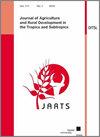Determinants of participation in rural non-farm economy in Zvimba District, Zimbabwe
Q3 Social Sciences
Journal of Agriculture and Rural Development in the Tropics and Subtropics
Pub Date : 2019-11-06
DOI:10.17170/KOBRA-20190613555
引用次数: 0
Abstract
The capacity of agriculture to provide sustainable livelihood opportunities is exceeded by the rural populations of developing countries, and with limited opportunities available in urban centres, the rural non-farm economy (RNFE) becomes pivotal in improving rural livelihoods. Within an empowerment agenda, it is important for policy makers to understand why households enter into the RNFE. We investigated participation in the RNFE of farm worker livelihoods along with the motivation for participation in RNF employment. Moreover, we sought to determine the key barriers and enablers to the adoption of high return strategies in RNFE activities by rural farm workers in Zimbabwe. Quantitative household surveys and qualitative focus group discussions were used to investigate levels of household dependency, education and skills, income accumulation and enterprising, expenditure and household assets. Our results showed that the primary motivation for entry into the RNFE was distress-pushed diversification. Our study found that market dynamics, limited skills, education level, and lack of capital are the paralysing factors towards significant income returns from RNFE for households. This information is critical for policy development for sustainable rural livelihoods, especially for rural farm workers who constitute the most vulnerable of the entire African rural population.津巴布韦Zvimba地区农村非农业经济参与的决定因素
发展中国家的农村人口超过了农业提供可持续生计机会的能力,而由于城市中心的机会有限,农村非农经济在改善农村生计方面至关重要。在赋权议程中,政策制定者了解家庭为什么加入RNFE是很重要的。我们调查了农场工人生计的RNFE参与情况以及参与RNF就业的动机。此外,我们试图确定津巴布韦农村农场工人在RNFE活动中采用高回报战略的主要障碍和促成因素。定量家庭调查和定性焦点小组讨论用于调查家庭依赖程度、教育和技能、收入积累和进取心、支出和家庭资产。我们的研究结果表明,进入RNFE的主要动机是困境推动的多元化。我们的研究发现,市场动态、有限的技能、教育水平和缺乏资本是家庭从RNFE获得显著收入回报的瘫痪因素。这些信息对于制定可持续农村生计的政策至关重要,尤其是对于在整个非洲农村人口中最脆弱的农村农场工人来说。
本文章由计算机程序翻译,如有差异,请以英文原文为准。
求助全文
约1分钟内获得全文
求助全文
来源期刊
CiteScore
2.30
自引率
0.00%
发文量
0
审稿时长
>36 weeks
期刊介绍:
The Journal of Agriculture and Rural Development in the Tropics and Subtropics publishes papers dealing with original research and review papers in the fields of plant production, animal nutrition and animal husbandry, soil science, rural economy and farm management, forestry and forest economy, veterinary hygiene and protection against epidemics.

 求助内容:
求助内容: 应助结果提醒方式:
应助结果提醒方式:


